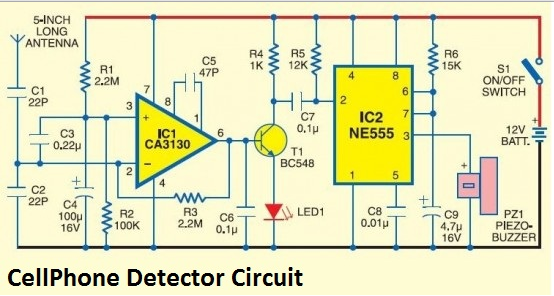Cell Phone Detector
This handy
mobile bug or cell phone detector, pocket-size mobile transmission detector or
sniffer can sense the presence of an activated mobile cellphone from a distance
of 2 meters. So it can be used to prevent use of mobile phones in
examination halls, confidential rooms, etc. It is also useful for detecting the
use of mobile phone for spying and unauthorised video transmission.
The
circuit can detect both incoming and
outgoing calls, SMS and video transmission even if the mobile phone is kept in
the silent mode. The moment the bug detects RF transmission signal from an
activated mobile phone, it starts sounding a beep alarm and the LED blinks. The
alarm continues until the signal transmission ceases.
Cell Phone Detector Circuit
Schematic
An ordinary RF detector using
tuned LC circuits is not suitable for detecting signals in the GHz frequency
band used in mobile phones. The transmission frequency of mobile phones ranges
from 0.9 to 3 GHz with a wavelength of 3.3 to 10 cm. So a circuit detecting
gigahertz signals is required for a mobile bug.
Here the circuit uses a 0.22μF
disk capacitor (C3) to capture the RF signals from the mobile phone. The lead
length of the capacitor is fixed as 18 mm with a spacing of 8 mm between the
leads to get the desired frequency. The disk capacitor along with the leads
acts as a small gigahertz loop antenna to collect the RF signals from the
mobile phone.
Op-amp IC CA3130 (IC1) is used
in the circuit as a current-to-voltage converter with capacitor C3 connected
between its inverting and non-inverting inputs. It is a CMOS version using
gate-protected p-channel MOSFET transistors in the input to provide very high
input impedance, very low input current and very high speed of performance. The
output CMOS transistor is capable of swinging the output voltage to within 10
mV of either supply voltage terminal.
Capacitor C3 in conjunction
with the lead inductance acts as a transmission line that intercepts the
signals from the mobile phone. This capacitor creates a field, stores energy
and transfers the stored energy in the form of minute current to the inputs of
IC1. This will upset the balanced input of IC1 and convert the current into the
corresponding output voltage.
Capacitor C4 along with
high-value resistor R1 keeps the non-inverting input stable for easy swing of
the output to high state. Resistor R2 provides the discharge path for capacitor
C4. Feedback resistor R3 makes the inverting input high when the output becomes
high. Capacitor C5 (47pF) is connected across ‘strobe’ (pin 8) and ‘null’
inputs (pin 1) of IC1 for phase compensation and gain control to optimise the
frequency response.
When the cell phone detector
signal is detected by C3, the output of IC1 becomes high and low alternately
according to the frequency of the signal as indicated by LED1. This triggers
monostable timer IC2 through capacitor C7. Capacitor C6 maintains the base bias
of transistor T1 for fast switching action. The low-value timing components R6
and C9 produce very short time delay to avoid audio nuisance.
Assemble the cell phone detector circuit on a general purpose PCB as compact
as possible and enclose in a small box like junk mobile case. As mentioned earlier,
capacitor C3 should have a lead length of 18 mm with lead spacing of 8 mm.
Carefully solder the capacitor in standing position with equal spacing of the
leads. The response can be optimised by trimming the lead length of C3 for the
desired frequency. You may use a short telescopic type antenna.
Use the miniature 12V battery of a remote control and a small buzzer to make the gadget pocket-size. The unit will give the warning indication if someone uses mobile phone within a radius of 2 meters.
Use the miniature 12V battery of a remote control and a small buzzer to make the gadget pocket-size. The unit will give the warning indication if someone uses mobile phone within a radius of 2 meters.


8 comments :
beginners when planning to starting their business and buy radio frequency detection device
It's very popular today to shop using the internet.
Thanks for the tips. cellular phone detector
What's up to every one, the contents present at this website are genuinely awesome
for people knowledge, well, keep up the good work fellows.
my site Hyper Fuel 9X Pre workout
hi guys
i was wondering to have some knowledge about mobile phone detector.but i was totally confused about the work of mobile phone detector .but i got my need i really appreciate the information.thankful for this post i loved it i will tell to my friends abut this post they would like it.
It's an awesome piece of writing in favor of all the web users; they will obtain
advantage from it I am sure.
Also visit my web site: Smartphone
Thanks for the good writeup. It in truth was a enjoyment account it.
Glance complicated to more brought agreeable from you!
However, how could we keep in touch?
my web-site - Calories and Fat - For Running
This is the Blog which is really appreciable. You did a great job by sharing this valuable and helpful information with us.Excellent work that’s not really much coming from an amateur publisher like me, but it’s all I could think after enjoying your posts.
Mobile Phone Detector
Excellent post. I was checking continuously this
blog and I'm impressed! Very helpful info specifically the last part :
) I care for such information a lot. I was looking for this particular information for
a long time. Thank you and good luck.
Feel free to visit my blog post - Best iPhone Prices
Thanks for sharing your thoughts about Advanced Background Checks.
Regards
Also visit my weblog: Click Here
Post a Comment